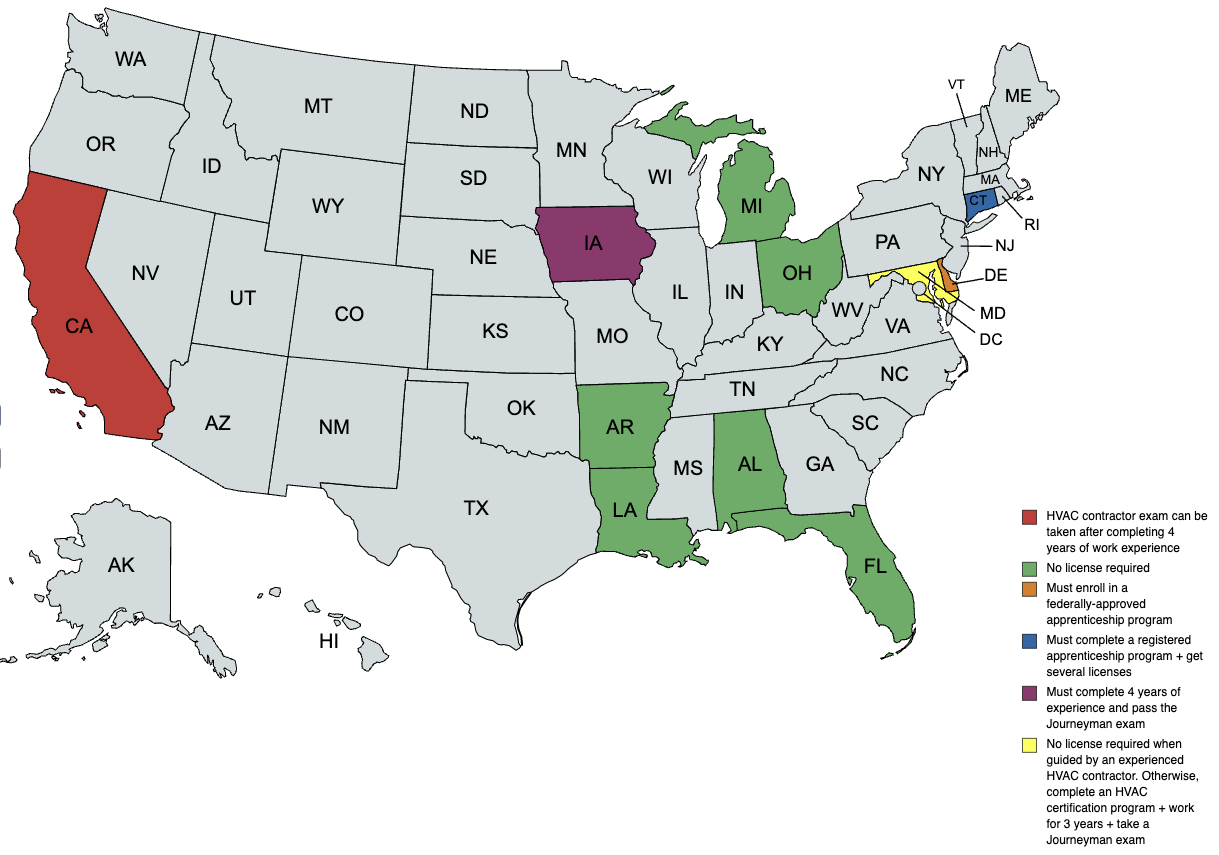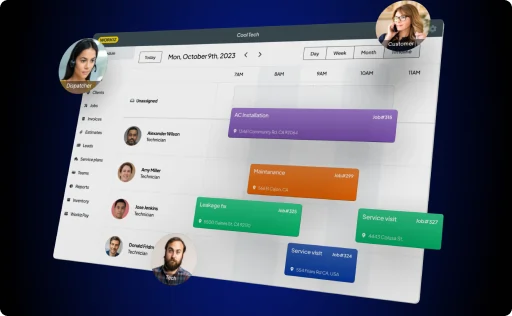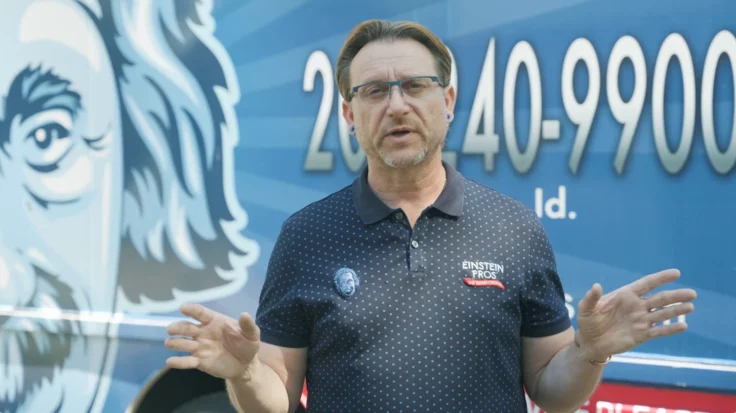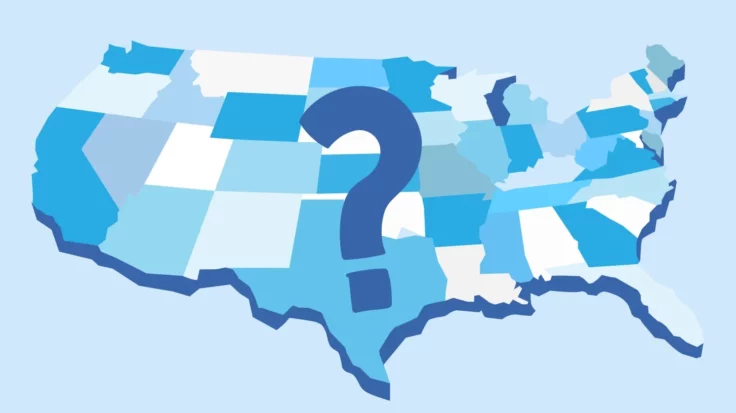HVAC license in other states
- HVAC license California
- HVAC license Florida
- HVAC license Georgia
- HVAC license Illinois
- HVAC license New York
- HVAC license Ohio
- HVAC license Pennsylvania
- HVAC license Texas
- HVAC Software
Whether you are in a commercial or residential property, an HVAC system will likely keep the temperatures comfortable. With demand rising for HVAC systems, there is also an increase in demand for certified HVAC technicians in the United States. According to the Bureau of Labor Statistics, there is an average of 38,500 job openings for HVAC technicians in the U.S each year. However, due to HVAC systems becoming increasingly complex, technicians are required to be certified. To reach your potential in the HVAC industry, you will need to receive a certification from an accredited HVAC program.
This article will cover how to get HVAC certified in the U.S and the different requirements across the country.
What is an HVAC certification license?
HVAC workers must hold specific licenses and certifications. An HVAC certification is a tool used to verify that a technician has the necessary knowledge to work in the field. But aside from their mandatory nature, these certificates expand your knowledge base and improve your resume as an HVAC technician.
Along with certifications, the licensing in the HVAC trade will determine the level at which a technician can work. Your state will determine the licensing requirements you must meet to work as an HVAC technician. In most cases, there is a Journeyman level that allows juniors to work on HVAC systems unsupervised and a Masters license that allows professionals to form a business.

3 types of HVAC certifications explained
If you are a new HVAC technician, there are three main types of HVAC certifications that you can complete. The only required certification that you need to attain is the EPA section 608 technician certification. Two other industry certificates that you can complete are a NATE certification and HVAC Excellence certification.
1. EPA Certifications
As an HVAC technician, you will be handling various types of refrigerants that are harmful when released into the atmosphere. After completing the EPA 608 certification, you will learn how to handle these chemicals safely while servicing HVAC systems. The Environmental Protection Agency has developed three different types of certifications you can possess, which are:
- Type I: For servicing small appliances, such as window air-conditioning units, refrigerators, and dehumidifiers.
- Type II: For servicing high-pressure heating and air-conditioning units. This certification also covers additional information, such as leak detection and repair requirements.
- Type III: For servicing appliances and equipment with low-pressure refrigerants, usually found in chiller units.
If you want to receive all of these EPA certifications, you can take the Universal exam that covers all certification types. Once you successfully pass the exams, you will receive accreditation to show employers. Most employers require at least a Type II certification, but it’s recommended you get a Universal certification.
2. NATE Certification
The largest non-profit certification organization is NATE, or North American Technician Excellence. If you are looking for training on the technical aspects of working as an HVAC technician, receiving a NATE certification will provide all the tools you need. It’s recommended that you take these exams when you first enter the field to improve your knowledge and take on more responsibility as a technician.
When you can perform more tasks for your employer, there is a higher chance you will be paid more. NATE programs like the Ready-to-Work Certificate are designed to support technicians at the start of their careers. These beginning courses will lay the groundwork for HVAC technicians and prep them for situations they will encounter at work.
The training and exams are created by HVAC professionals, using real-world situations for instruction. A technician must receive a 70% or higher on the exams to receive the NATE certification. Once NATE-certified, the certification will last two years before there’s a need to renew it.
3. HVAC Excellence Certification
If you want to stand out from the crowd of other HVAC technician applicants, having a certification from HVAC Excellence can help. Since 1999, this organization has set the standards for HVAC/R training programs. They have online training programs starting from entry-level to master specialist certifications.
Depending on the certification, there are some prerequisite requirements that you must meet for certification. Professional Level Technician Certificates require technicians to have two or more years of in-field experience. However, there are employment-ready certifications with no prerequisites.
How to become a licensed and certified HVAC technician in California?
Are you a California resident wanting to know how to get an HVAC license? Fortunately, California does not have prerequisite requirements to start working as an HVAC technician. Most technicians start by attending an apprenticeship program or working as a trainee when entering the field.
Once you have accumulated four years of work experience in an HVAC position, you are eligible to take the HVAC contractor exam. Additionally, you can also count one year of vocational school as a year of work experience. If you wish to work at the contractor level, you can pull building permits and start a business.
The most crucial part of meeting the work experience requirements is the experience needs to be at a Journeyman level. An HVAC Journeyman requires no supervision to complete the necessary tasks of the job. You will need past employers to sign off on your work experience to verify your work history.
How to become a licensed HVAC technician for the rest of the states in the U.S?
If you want to learn how to get HVAC certified in your state, there are unique requirements for each state. 31 out of 50 states require no licensing to be an HVAC technician, allowing you to work freely in the position. The only certification required to work in these states is typically the EPA 608 certification.
Some of the following states that require no license to work as an HVAC technician are:
- Alabama
- Ohio
- Florida
- California
- Arizona
- Louisiana
- Missouri
If you live in one of the 31 states without licensing requirements, you can apply for HVAC technician roles. If you live in a state with licensing requirements, there is a wide range of different steps you need to take. Whether it’s completing an apprenticeship program or trade school, below are some of the licensing requirements across the United States.
How to get HVAC certified in Delaware
To receive a license to work in Delaware, you must enroll in a federally-approved apprenticeship program. An apprenticeship program is four years or 8000 working hours in the field and 144 hours of classroom training per year. If you want to be an HVAC Journeyman, you must earn the Journeyman’s Certification of Completion from an apprenticeship program.
How to get HVAC certified in Connecticut
Connecticut requires a long list of licenses that the Connecticut Department of Consumer Protection issues. If you want to receive these licenses, you must complete a registered apprenticeship program. The following licenses are eligible for HVAC technicians looking to reach journeyman status:
- D-2 Limited Warm Air, Air Conditioning, and Refrigeration Journeyperson
- D-4 Limited Cooling Journeyperson License
- G-2 Limited Heating, Piping, and Cooling Journeyperson
- S-2 Unlimited Heating, Piping, and Cooling Journeyperson
- S-4 Limited Heating, Cooling, and Piping Journeyperson
- S-6 Limited Heating, Hot Water, and Steam Journeyperson
- S-8 Limited Journeyperson
- S-10 Limited Heating Cooling Journeyperson
How to get HVAC certified in Iowa
Iowa residents looking to enter the HVAC field must start in an apprenticeship program and work under the supervision of a master technician. Once you have four years of experience and pass the Journeyman exam, you can receive a Journeyman license. After working for two years in a Journeyman role, you are eligible for the master-level exam.
How to get HVAC certified in Maryland
As an apprentice HVAC technician in Maryland, you must work under the supervision of a licensed Master technician. If you work under an experienced HVAC contractor, you do not need to complete a Journeyman exam. However, if you complete an HVAC certification program and work for a combined total of three years–you must take an exam.

HVAC certification basic requirements
The basic requirements for certification will differ depending on what U.S state you reside in. If you live in a state that requires state-mandated licensing, you may wonder how to get an HVAC license. Start by signing up for an apprenticeship program approved by the U.S Department of Labor.
Most of these apprenticeship programs require a high school diploma or equivalent to be accepted. Once you attend the apprenticeship program, you will be required to work as an HVAC technician while attending weekly classes. These classes will teach you how to get HVAC certified and the technical knowledge you need to pass the Journeyman exam.
2 Programs that will help you make your way to an HVAC certification
As you work your way up as an HVAC technician, you may think you need additional help working in the role. Programs help you expand your knowledge and teach the correct way to perform tasks. If you want help meeting your HVAC technician goals, complete the following two programs.
ASHRAE
The American Society of Heating, Refrigerating, and Air-Conditioning Engineers has several online classes you can use to improve your skills. You can attend a wide range of professional development courses that will cover all aspects of the trade and can be used for continuing education requirements (CEUs).
HVAC Training Solutions
If you are looking to learn HVAC basics, a great place to start is with HVAC Training Solutions. The online platform’s HVAC technician course contains 20 modules covering all of the fundamentals. HVAC Training Solutions courses include lectures with repair and maintenance simulations. This online course could also be a good option if you need a refresher on HVAC knowledge.

FAQs About HVAC
Are there any online training programs to get an HVAC certification?
Aspiring HVAC technicians are no longer limited to in-person training programs to receive an HVAC certification. Several online training programs teach the fundamentals of heating, ventilation, and cooling systems. Some of the most popular online HVAC training programs are taught by:
- Air-Conditioning Contractors of America
- Penn-Foster College
- HVAC Training Solutions
- HVACRedu
HVAC-R certificate vs. associate degree – what are the differences?
If you value working in the HVAC industry as quickly as possible, students can complete an HVAC-R certificate in under one year. Associate degrees take longer to finish with an average two-year timeframe but usually provide a greater level of education. These training programs prepare students to enter the field and complete the EPA section 608 exam.
How do you start an HVAC business?
Starting an HVAC business is similar to establishing any other service-based business. You will need startup capital, with the U.S. Office of Energy Efficiency and Renewable Energy estimating costs of up to $100,000. You will need to start with a solid business plan, market your services effectively, and receive the necessary business licensing.
Additionally, you will need to spend time working in the field to receive your HVAC contractor’s license and get the necessary experience. Due to every state having different licensing, it’s best to speak with your local regulatory office about business licensing requirements. As you establish your business entity, you can begin marketing your HVAC services.
Is it profitable to start an HVAC business?
The profitability of an HVAC business can vary greatly depending on the size, location, and experience in the industry. Businesses can range from a one-person operation with a profit of $45,00 per year, while other large businesses can bring in millions of dollars. Profit margins can range from 2% to over 10%, depending on the business structure.
How much does It cost to get an HVAC license?
The cost of getting an HVAC license will depend on what training type you use for your education. The least costly option will be an apprenticeship program, allowing you to work and learn simultaneously. If you prefer a school setting for your training, going to a trade school or community college is the better choice.
Below is a cost comparison of the three main HVAC training types:
- Apprenticeship Program – $500-$2,000
- Community College – $4,868 per year
- Trade School – $1,200 – $15,000
Final thoughts
If you want to advance in your career by receiving an HVAC certification, there are a few key things to remember. Your location plays a significant role in the certification requirements as an HVAC technician. If you are in a state with no licensing requirements, all you need is an EPA 608 certification.
In the states with licensing requirements, speak to your local licensing office to learn the steps you need to take. No matter the requirements, learning how to get an HVAC license will give you the chance to work in a growing industry. Don’t wait—get started working in the HVAC industry today!
Scheduling calendar
No more juggling act! With Workiz’s intuitive calendar, you can easily spot gaps for emergency calls and quickly identify the nearest technician.
Online booking
Let customers book 24/7. Because emergencies don’t always happen during business hours.









